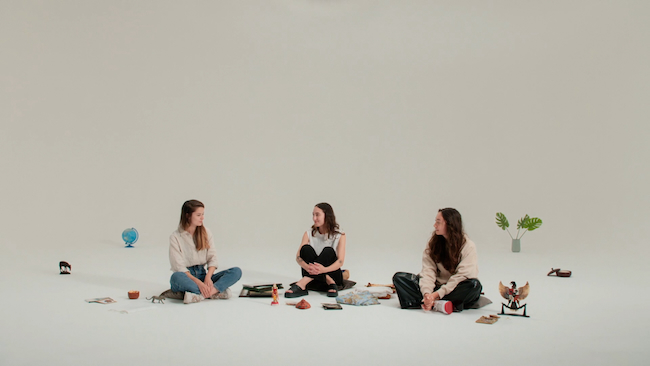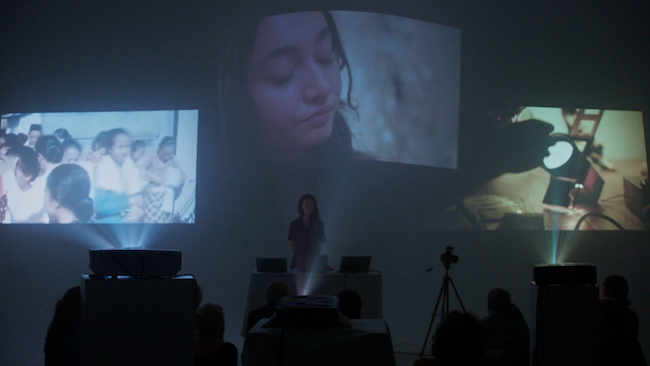A documentary draws new attention to intergenerational grief and decolonial healing
Ana Dragojlovic and Astrid Kerchman
In their documentary Indisch Zwijgen (Indo’s Silence, 2022) filmmakers Juliette Dominicus and Sven Peetoom bring renewed attention to an enduring topic. The word zwijgen translates as ‘to keep silent’ and ‘to shut up’. It references a metanarrative about intergenerational silenc(ing) in both public and personal discussions about Indisch identity and belonging. In their efforts to make visible the complex emotions that constitute Indisch zwijgen, Dominicus and Peetoom, who are themselves Indisch, engage with representations of intergenerational feelings such as pain, sadness, grief, and shame.
Indisch people trace their genealogies back to the former colonial Dutch East Indies and the formations of Eurasian communities dating back to the early seventeenth century, when European (mainly Dutch) men began to engage in intimate relationships with local Indonesian women. These intimacies occurred either through the institution of legal marriage or through informal intimate relationships with the so-called nyai (housekeepers/bed partners). Indisch people acquired the juridical status of ‘European’ only after the father’s formal recognition as such. Many Indisch people were imprisoned in Japanese incarceration camps during the Second World War, were both victims and perpetrators during the Indonesian war for independence and subjected to racialised assimilation policies upon their repatriation to the Netherlands.
In this review, we explore how the filmmakers use the therapeutic mechanism of repair to decolonise silenc(ing), which has been reproduced in the colonial and postcolonial heteropatriarchal system of power. The heteropatriarchal system of power is a social structure where power is primarily held by cis-heterosexual men. This system gives priority to heterosexual norms while marginalising or oppressing women, LGBTIQ+ folks, and nonconforming gender identities. Additionally, heteropatriarchy can perpetuate sexism, homophobia, transphobia, and racism.
Breaking the silence
Indisch Zwijgen belongs to the fast-emerging genre of decolonial documentaries dedicated to decolonising Dutch collective memory of the former Dutch East Indies (1600-1942). The protagonists in this film are deeply aware of how intergenerational silences affect people from many different cultural backgrounds and heteropatriarchal systems of oppression, and not just Indisch people. Deeply committed to making visible what has been supressed throughout generations, one of the protagonists, Mei Oele, urges people of different cultural backgrounds who were born in the early 2000s like herself to share stories of intergenerational silence, saying ‘I feel like we do not have to hide the stories anymore’. For Oele and the other protagonists in Indisch Zwijgen, the excavation of intergenerational grief is crucial for healing intergenerational trauma. With this focus, Indisch Zwijgen stands as a unique decolonial documentary, taking a therapeutic approach as a means to liberate oneself and others from heteropatriarchal thinking and ways of being in the world.
Since its release in May 2022 the documentary has received much critical acclaim in the Dutch media. It has been screened on television, in over twenty community halls and cinemas across the country and has been featured in public events addressing the topic of Dutch colonialism and memory culture. The film has been discussed in various media outlets, including prominent Dutch newspapers such as NRC and Trouw, as well as smaller platforms focused on Indonesian culture, such as Arjati and Meer dan Babi Pangang. Funding for the film came from several Dutch grant providers (Prins Bernhard Cultuur Fonds, Fonds ZOZ and Amerte Fonds), as well as through crowdfunding. It was produced by There Will Be Film, a foundation that supports experimental and innovative films focusing on underrepresented cultures.
An ambiguous inheritance
The documentary follows three artists: a spoken word artist Amara van der Elst (b.2001), DJ and visual artist Mei Oele (b.1999), and one of the filmmakers, Juliette Dominicus (b.1997). The film opens with a brief introduction to Indo-Dutch history dating back to the establishment of the Dutch East India company (VOC) in the 17th century, emphasising that over one and a half million Dutch people with Indo-Dutch roots lack substantial knowledge about their family history.

Early in the documentary we are introduced to the three protagonists who are seated side-by-side against a white background, all facing the camera. The scene resembles an open room, with the dominant bare whiteness suggesting vast open-endedness, emphasising the silent absence-presence enveloping them. Amara, Mei and Juliette introduce themselves as third generation Indo-Dutch committed to breaking intergenerational silences. Their goal is to collaboratively create an artwork exploring the silences prevalent in their respective families.
Beginning with the premise that objects and photographs contain unspeakable histories, they each brought objects of significance from their families. As they share their memories associated with the objects, they realise that each brought a unique assortment of items. Throughout their conversation, they describe various aspects of intergenerational silences, such as feelings of pain, shame, and grief that their ancestors were not able to share, but which they, as descendants living in close proximity to their relatives, have felt. Grappling with such an ambiguous inheritance, the three protagonists’ weave together various modes of tracing silences. They convey information, for example, not through verbal narration but through experimental filmmaking techniques that depict silences, symbolic representations and scenes showing the artists’ journeys towards their final artwork.
The use of experimental filmmaking allows audiences insights into how different therapeutic modalities, which allow the protagonists to trace silences, act as mechanisms of repair. Throughout the documentary we learn about Amara’s experiences of emotional pain that is ‘not just her own’ but belongs to her ancestors who once lived in Indonesia. We hear about protagonists’ visits to ancestral places in Indonesia to uncover meaning behind a deep sadness that migrants’ grandchildren carry but do not fully understand.
In her pursuit of a deeper connection to her Indisch ancestors we follow Juliette as she visits a therapist and engages in a family constellation session. During the session, where names of different ancestors are written on pieces of paper spread across the floor, Juliette explores her feelings of distance and proximity to various family members. As she steps on the piece of paper representing her father’s position, she realises that she is not the only one who is disconnected from her Indonesian roots, but her father as well. We witness how the three protagonists share insights derived from their searches with their family members as part of their efforts to find healing for intergenerational trauma, not only for themselves but also for their close relations.
The filmmakers’ commitment to therapeutic repair extends beyond the film. Dominicus and Peetoom also developed an impact program to accompany the documentary. This includes in-depth workshops, post-screening discussions and meetups. These various modes of engagement with the documentary were designed to motivate the audience to participate. In this way, the film audiences were not approached as passive recipients merely interested in Indisch intergenerational silencing, but rather as individuals committed to ‘breaking the silence’.

In this deeply moving documentary, we follow the grandchildren of people who endured unspeakable violence due to armed conflict, racialisation, and gendered segregation. These descendants navigate the intergenerational inheritance of sadness, grief, and shame in search of healing for intergenerational trauma. While firmly rooted in the recent decolonial movement in the Netherlands, the filmmaker’s intervention resonates significantly with many other contexts where prolonged histories of heteropatriarchal structural oppression have engendered intergenerational trauma.
Ana Dragojlovic (ana.dragojlovic@unimelb.edu.au) is an Associate Professor in Gender Studies at the University of Melbourne. Astrid Kerchman (astridmkerchman@gmail.com) is as a research assistant, lecturer, and coordinator in the Gender Studies programme at Utrecht University (NL). Astrid is the former project coordinator of MOED Museum of Equality and Difference.











